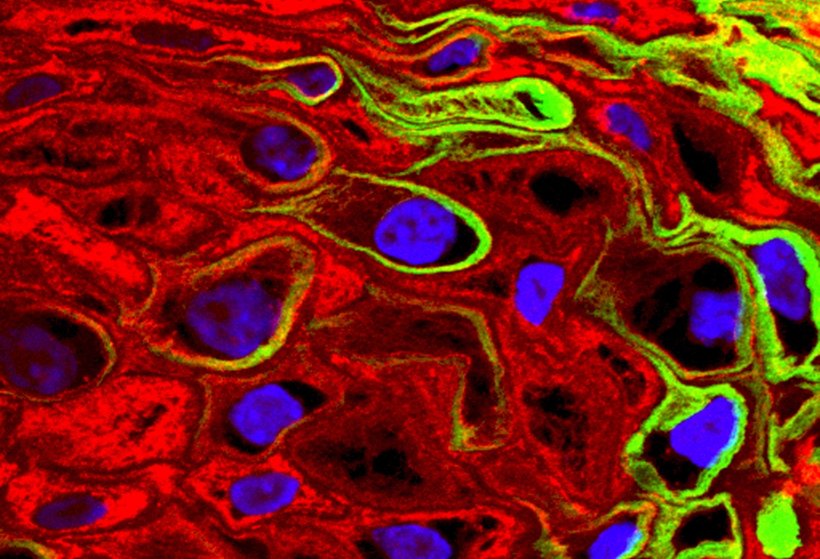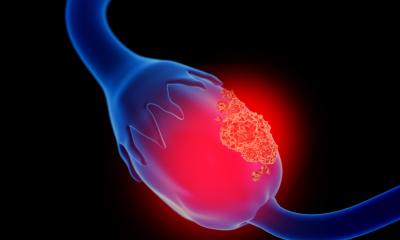
Image credit: NIMR, Francis Crick Institute. Source: Wellcome Collection (CC BY-NC 4.0)
News • IC before CRT
Cervical cancer: Improved treatment course increases survival, reduces recurrence
A course of treatment with existing drugs prior to chemoradiation led to a 35% reduction in the risk of death or return of cancer, in trial results presented by researchers from University College London (UCL) and University College London Hospitals (UCLH).
The INTERLACE phase III trial, funded by Cancer Research UK and UCL Cancer Trials Centre, assessed whether a short course of induction chemotherapy (IC) prior to chemoradiation (CRT) could reduce the rate of relapse and death among patients with locally advanced cervical cancer. As part of an analysis of clinical data, the preliminary results were presented at the European Society for Medical Oncology (ESMO) congress.
The peak incidence of cervical cancer is in women in their early thirties, with around 3,200 new cases each year in the UK. CRT has been the standard treatment for cervical cancer since 1999, but despite improvements in radiation therapy techniques cancer returns in up to 30% of cases. The five-year survival rate for cervical cancer stands at around 70%.
Timing is everything when you’re treating cancer. The simple act of adding induction chemotherapy to the start of chemoradiation treatment for cervical cancer has delivered remarkable results in this trial
Iain Foulkes
Over the course of 10 years, 500 patients took part in INTERLACE at hospitals in the UK, Mexico, India, Italy and Brazil. Those who participated in the study had been diagnosed with cervical cancer, which was large enough to be seen without a microscope but had not yet spread to other parts of the body. The median age of patients in the trial was 46. Patients were randomly allocated to receive either standard CRT (external radiation with weekly cisplatin and brachytherapy), or an initial six-week course of IC (carboplatin and paclitaxel chemotherapy) followed by the same standard CRT described above. After five years, 80% of those who received IC plus CRT were alive and 73% had not seen their cancer return or spread. In the standard treatment group, 72% were alive and 64% had not seen their cancer return or spread.
Dr Mary McCormack, lead investigator of the trial from UCL Cancer Institute and UCLH, said: “Our trial shows that this short course of additional chemotherapy delivered immediately before the standard CRT can reduce the risk of the cancer returning or death by 35%. This is the biggest improvement in outcome in this disease in over 20 years. I’m incredibly proud of all the patients who participated in the trial; their contribution has allowed us to gather the evidence needed to improve treatment of cervical cancer patients everywhere. We couldn’t have done this without the generous support of Cancer Research UK.”
Because the drugs required for IC, carboplatin and paclitaxel, are cheap, accessible and already approved for use in patients, the authors say they could be incorporated into standard of care treatment relatively quickly.
Professor Jonathan Ledermann, senior author of the results from UCL Cancer Institute, said: “Cervical cancer is a disease that often strikes women in their thirties or younger. Those with locally advanced disease have a relatively high chance of relapse and the disease can take a huge toll on patients and their families. This makes the results of the INTERLACE trial, which significantly improves overall survival, an important advance in treatment.”
Dr Iain Foulkes, Executive Director of Research and Innovation at Cancer Research UK, said: “Timing is everything when you’re treating cancer. The simple act of adding induction chemotherapy to the start of chemoradiation treatment for cervical cancer has delivered remarkable results in this trial. A growing body of evidence is showing the value of additional rounds of chemotherapy before other treatments like surgery and radiotherapy in several other cancers. Not only can it reduce the chances of cancer coming back, it can be delivered quickly using drugs already available worldwide. We’re excited for the improvements this trial could bring to cervical cancer treatment and hope short courses of induction chemotherapy will be rapidly adopted in the clinic.”
Source: University College London
26.10.2023










